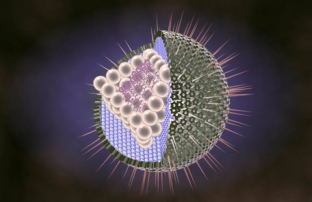Herpes can hide in the human body without showing any external symptoms. The human herpes virus is especially dangerous for pregnant women (risk of premature birth, congenital pathologies, secondary infertility, neonatal fetal death); people with a weakened immune system (risk of autoimmune disease); cancer patients.
A new discovery will allow the development of alternative treatments for diseases caused by the human herpes virus.
Human herpes virus types and associated problems
In 1996, the journal Medical Microbiology published information on the existence of more than 100 herpes viruses known to science, eight of which can infect humans. For example:
- Herpes simplex virus (HSV-1) is transmitted by oral contact and causes cold sores on the lips;
- Herpes virus type 2 (HSV-2) causes painful blisters or sores in the genital area;
- herpes virus (HSV-3) 3 types – herpes zoster – causes chickenpox;
- Herpes virus type 4 (HSV-4), also known as Epstein-Barr virus, causes infectious mononucleosis (glandular fever).
Human herpes virus HSV-4 is also associated with a number of other human diseases, including cancer. People with weakened immune systems or transplant patients are at risk of the disease.
The Centers for Disease Control and Prevention (CDC) lists this virus as one of the most prevalent human viruses in the world. According to experts, the virus can often be in the human body without the appearance of characteristic symptoms.
Limited treatment options for human herpesvirus
Only one class of antiviral drug is used to treat human herpes virus. This means that if the virus is resistant to such drugs, there is no alternative treatment.
Scientists at the University of Utah School of Medicine, led by Dr. Sankar Swaminathan, are looking for new drugs to treat viral infections. Specialists are investigating drugs that may be effective in suppressing the herpes virus, and whose mechanism of action differs from existing therapies.
Currently available drugs inhibit viral DNA replication, thus blocking the central stage of the viral infection cycle.

Spirolactone and its role in the treatment of human herpesvirus
Spirolactone, like existing drugs, blocks the key stage in the development of a viral infection, which is characteristic of all types of this virus, by blocking the so-called SM protein, which is necessary at a late stage of the infectious cycle.
Based on the results of the study, experts suggest that spirolactone is a potentially effective drug for the development of a new class of antiherpes drugs.
Dr. Swaminathan explains:
"It is surprising that a drug that has been used successfully in clinical practice for over 50 years is also effective as an Epstein-Barr virus inhibitor. Such a discovery suggests that fundamental research can reveal the properties of drugs that we did not know about before.
Spirolactone is typically used in the treatment of heart failure. It works through a metabolic mechanism. However, in the case of fighting a viral infection, a different route of action of the drug is observed.
The authors of the study found that drugs similar to Spirolactone do not affect the development of the human herpes virus.
The researchers suggest that Spirolactone will become a model for the development of a new class of drugs for treatment of human herpes virus.
They believe the drug can be modified to act as an antiviral without causing side effects. The resulting drugs can be used to fight drug-resistant infections.







Add a comment